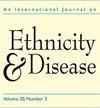Perceived Susceptibility to Chronic Kidney Disease and Hypertension Self-Management among Black and White Live Kidney Donors.
IF 1.7
3区 医学
Q1 PUBLIC, ENVIRONMENTAL & OCCUPATIONAL HEALTH
引用次数: 0
Abstract
Background Despite the societal benefits of live kidney donation, Black donors may be more likely than White donors to develop hypertension (HTN) and chronic kidney disease after donation. Among live kidney donors diagnosed with post-donation HTN, little is known about potential racial/ethnic differences in HTN self-care behaviors and perceived susceptibility to developing kidney disease. Methods We ascertained electronic medical records and phone survey data from live donors enrolled in the multi-center Wellness and Health Outcomes of LivE Donors (WHOLE-Donor) Hypertension Care Study between May 2013 and April 2020. Using multivariable logistic regression models performed January through June 2021, we examined potential associations of donor race/ethnicity with perceived susceptibility to kidney disease and self-care behaviors (ie, Behavioral Risk Factor Surveillance System measure assessing self-reported actions to control high blood pressure). Results The study included 318 US-based live kidney donors who developed post-donation HTN (57.6% female; 78.9% White; 18.6% Black; and mean age 46.7 years at donation). Black donors were equally as likely as White donors to report being moderately or strongly concerned about developing kidney disease (adjusted odds ratio, aOR: 1.27, 95%CI: .66, 2.14, P=.57). Donors with diabetes were more likely than those without diabetes (aOR: 2.43, 95%CI: 1.03, 5.01, P=.04), while donors aged >50 years were less likely than younger donors (aOR: .39, 95%CI: .18, .85, P=.02) to report being moderately or strongly concerned about kidney disease. Overall, 87% of donors reported taking at least one action to help control blood pressure, with no significant differences by sociodemographic factors. Conclusions We found no substantial differences in perceived susceptibility to kidney disease among Black and White donors, despite published evidence that Black donors may experience greater risk of developing kidney disease than White donors. Behavioral interventions to enhance knowledge about future disease risk, attitudes, and self-care strategies among living kidney donors may be beneficial.黑人和白人活体肾脏捐献者对慢性肾脏疾病和高血压自我管理的易感性。
背景尽管活体肾脏捐赠具有社会效益,但黑人捐赠者在捐赠后可能比白人捐赠者更容易患上高血压和慢性肾脏疾病。在被诊断为捐赠后HTN的活体肾脏捐献者中,人们对HTN自我照顾行为和易患肾脏疾病的潜在种族/民族差异知之甚少。方法我们确定了2013年5月至2020年4月期间参加live捐献者(全捐献者)高血压护理研究的活体捐献者的电子医疗记录和电话调查数据。使用2021年1月至6月进行的多变量逻辑回归模型,我们研究了供体种族/民族与肾脏疾病易感性和自我护理行为(即行为危险因素监测系统评估自我报告的控制高血压的行为)的潜在关联(57.6%为女性;78.9%为白人;18.6%为黑人;平均捐赠年龄46.7岁)。黑人捐赠者与白人捐赠者报告中度或高度关注肾脏疾病的可能性相同(调整后的比值比,aOR:1.27,95%CI:.66,2.14,P=.57)。患有糖尿病的捐赠者比没有糖尿病的捐赠者更有可能(aOR:2.43,95%CI:1.03,5.01,P=.04),而年龄>50岁的捐献者报告中度或重度关注肾脏疾病的可能性低于年轻捐献者(aOR:.39,95%CI:.18,.85,P=0.02)。总体而言,87%的献血者报告至少采取了一种行动来帮助控制血压,社会人口因素没有显著差异。结论我们发现黑人和白人捐赠者对肾脏疾病的易感性没有显著差异,尽管已发表的证据表明,黑人捐赠者可能比白人捐赠者患肾脏疾病的风险更大。行为干预可以增强活体肾脏捐献者对未来疾病风险、态度和自我护理策略的了解,这可能是有益的。
本文章由计算机程序翻译,如有差异,请以英文原文为准。
求助全文
约1分钟内获得全文
求助全文
来源期刊

Ethnicity & Disease
医学-公共卫生、环境卫生与职业卫生
CiteScore
6.30
自引率
0.00%
发文量
43
审稿时长
6-12 weeks
期刊介绍:
Ethnicity & Disease is an international journal that exclusively publishes information on the causal and associative relationships in the etiology of common illnesses through the study of ethnic patterns of disease. Topics focus on: ethnic differentials in disease rates;impact of migration on health status; social and ethnic factors related to health care access and health; and metabolic epidemiology. A major priority of the journal is to provide a forum for exchange between the United States and the developing countries of Europe, Africa, Asia, and Latin America.
 求助内容:
求助内容: 应助结果提醒方式:
应助结果提醒方式:


